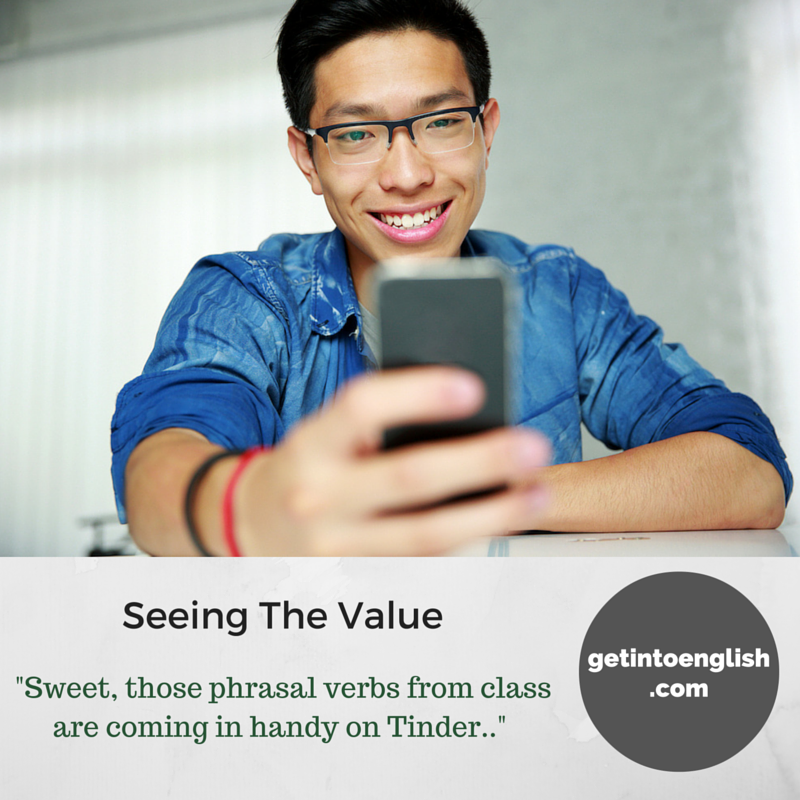When you get better at tennis, other good players will want to play with you. Likewise, as you become a better dancer, other good dancers will want to dance with you.
It’s a very similar concept when it comes to finding an English teacher.
If a teacher is settled in a particular city and sees themselves as being ‘good’, they’re going to be looking for good students. But because they’re good, these teachers will already be busy and there will be unspoken competition between the students for the teacher’s limited time.
So how you present yourself is actually quite important when looking for a new teacher.
Now of course this is subjective, but over the years good teachers see patterns in how ‘good’ and ‘not so good’ students communicate (it should be the same for you too when it comes to interviewing different teachers).
Compare two potential students who have contacted me regarding possible lessons:
- One was a man who wrote a very brief message: “Hi, I want to know what are your prices?”
- The second was a woman who was a writer and had read many of the articles on Get Into English before contacting me. Her opening letter was a very friendly introduction, and included some details about what she was looking to focus on. She said she liked my ideas on learning and that’s why she contacted me for possible lessons.
If you were a teacher, who would you prefer to work with?
Of course you could say that you really need to meet someone in person before deciding who is better to work with, but as I said before, there are patterns in how potential students behave (again, just like teachers).
People who just ask me for the price straight away without any other introduction or friendly start tend to have these characteristics in common:
- They’re more likely to ask me for a discount and they don’t want to pay by invoice (ie they want to pay cash in hand at a ‘discount rate’). Apart from putting me in an awkward position, the problem with this is that they’ll then cancel some lessons at the last minute, be less organised and basically not respect the whole learning process.
- Because they focus on the price, they’re looking for any teacher and not a ‘good’ teacher.
- They’re less likely to want to buy a coursebook even if it’s necessary (eg for IELTS exam preparation) and they’re more likely to go to some torrent site and steal the book. It’s a basic lack of respect towards the value others are providing.
[As a quick note, if you are on a budget and don’t have a lot of money, that’s ok – I’ll have a follow up article soon on how you can still look at value.]
Price v. Value
The value a good teacher can give you – that is, what they give back to you in terms of knowledge, practice, confidence, and improved communication skills – will be more than what you paid for.

If Warren Buffett was giving a big seminar on how to invest properly, would you think of the price or the value you get from talking to the world’s most successful investor?
If you wanted to learn about how to set up a business, wouldn’t you pay more to hear what Jeff Bezos has to say on the matter?
How much better would you be at tennis if Roger Federer was your coach?
“Yes, but you guys are not Warren Buffett or Roger Federer. You’re English teachers.”
It’s true that some Czech learners I’ve come across have a problem with spending money on education. I don’t know if it’s because they’re socialists and believe that the state or their company should pay for their lessons, or if they simply don’t value professional teachers.
Whatever you think, you’re right. If you don’t value professional teachers, then you’ll try to find cheaper options and you might continue to believe that it’s not worth paying more because you’re getting less. It’s a vicious circle.
“But Where’s This ‘Value’?”
Sometimes it’s just the little things that make a big difference:
Once I had a student who was worried that he had sent a slightly rude email to business associates in another country. It was written in a Czech way – saying ‘no’ very directly to their proposal but without any other comments, and they didn’t reply. I looked at the email, and yes, it did seem abrupt, a bit cold.
What I recommended to him was to still make it clear he didn’t agree with this proposal, but that he appreciated their dialogue and that he looked forward to discussing future proposals.
So he wrote again and added a few sentences to focus on their co-operation, and they were back to business. We also looked at some useful language used in emailing, and spoke about how cultural differences can impact on communication.
Sometimes the value a professional teacher gives is to act as a consultant, for example, by giving advice on how to find a job in an English-speaking country.
Sometimes it’s simply the fact we speak the language very well. Occasionally I speak in slower ‘Teacher English’ when I explain grammar or something more complex, but usually I’ll want you to hear natural spoken English (eg “So what did you get up to yesterday..?”). I’d say it’s one of the best things I offer, even to beginners.
Sometimes it’s just simply that we’ve travelled so much, read so many books, met so many people and heard so many stories that we often ask good questions to help find out more about your challenges and how to solve them.
The value in fact could be anywhere:
- It’s the time we take to find interesting materials for you
- The worksheets and games we make to add variety to your lessons
- The seminars and workshops we attend to make sure we’re loaded with new ideas
- The language and cultural aspects we discuss together so you can get that job or date that English girl or guy
- The feedback we give you on your mistakes and general communication so that you can improve each week
- It could also be something ‘boring’ – all the top professional teachers I know have really studied the language and so they can paint a better picture for you of English grammar (whereas occasionally some of the coursebooks have over-simplified or misleading rules).
- Cutting to the chase – finding out more about you so that we can focus on what’s really important for you.
Pour Conclure
Many students looking for a teacher often focus on the price, and so they choose someone based on what their lessons cost. However, you’ll get a lot more in the long run if you think of the value a professional teacher can give back to you.
I’m not saying you should choose the most expensive teacher – I’m saying look at what they’re offering.
Try it next time you’re looking – I’m sure it’ll be well worth it!


Leave a Reply